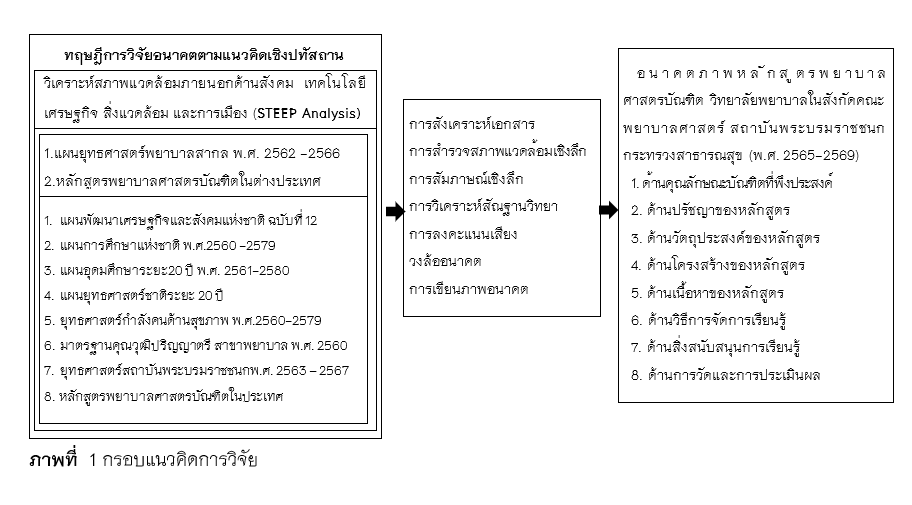อนาคตภาพหลักสูตรพยาบาลศาสตรบัณฑิต วิทยาลัยพยาบาลในสังกัดคณะพยาบาลศาสตร์ สถาบันพระบรมราชชนก กระทรวงสาธารณสุข (พ.ศ. 2565-2569)
Main Article Content
บทคัดย่อ
การวิจัยครั้งนี้มีวัตถุประสงค์เพื่อศึกษา 1) สภาพ ปัญหา และความต้องการ 2) สร้างอนาคตภาพหลักสูตรพยาบาลศาสตรบัณฑิต วิทยาลัยพยาบาลในสังกัดคณะพยาบาลศาสตร์ สถาบันพระบรมราชชนก กระทรวงสาธารณสุข (พ.ศ. 2565-2569) และ 3) ตรวจสอบยืนยันอนาคตภาพหลักสูตรที่สร้างขึ้น การดำเนินการวิจัยมี 3 ระยะ คือ 1) ศึกษาสภาพ ปัญหา และความต้องการ โดยการศึกษาเอกสาร การสัมภาษณ์เชิงลึก การวิเคราะห์สัณฐานวิทยา และการลงคะแนนเสียงจากนายกสโมสรนักศึกษา แพทย์ และผู้ทรงคุณวุฒิ 2) สรุปภาพอนาคตและการสร้างวงล้ออนาคตจากข้อมูลที่ได้ และ 3) ตรวจสอบและยืนยันอนาคตภาพ โดยการลงฉันทามติจากผู้เชี่ยวชาญ
ผลการวิจัย พบว่า สภาพ ปัญหาที่สำคัญ คือ บัณฑิตมีผลลัพธ์ด้านความรู้ ด้านทักษะทางปัญญา และด้านทักษะการวิเคราะห์ไม่เป็นไปตามเป้าหมายโดยเฉพาะทักษะด้านภาษาอังกฤษ ความต้องการเกี่ยวกับการจัดการเรียนรู้หลักสูตรพยาบาลศาสตรบัณฑิต คือ 1) ด้านคุณลักษณะบัณฑิตที่พึงประสงค์ต้องเป็นผู้ที่มีความรู้ดี คิดดี และปฏิบัติดี 2) ด้านโครงสร้างของหลักสูตรต้องลดเวลาเรียนและเพิ่มเวลารู้ 3) ด้านเนื้อหาของหลักสูตรต้องทันสมัยและใช้ได้จริง 4) ด้านวิธีการจัดการเรียนรู้ต้องได้ลงมือทำ นำเทคโนโลยีมาใช้ ให้เวลาเรียนรู้ และบูรณาการร่วมกัน 5) ด้านสิ่งสนับสนุนการเรียนรู้ เพียงพอประสิทธิภาพดีเข้าถึงได้ตลอด และ 6) มีการวัดและประเมินผลที่หลากหลาย ผลการสร้างอนาคตภาพหลักสูตรพยาบาลศาสตรบัณฑิต วิทยาลัยพยาบาลในสังกัดคณะพยาบาลศาสตร์ สถาบันพระบรมราชชนก กระทรวงสาธารณสุข (พ.ศ. 2565-2569) และผลการตรวจสอบและยืนยันอนาคตภาพจากการลงฉันทามติจากผู้เชี่ยวชาญ มีความสอดคล้องกัน ดังนี้ 1) ด้านคุณลักษณะบัณฑิตที่พึงประสงค์ ต้องมีความรู้ดี ความคิดดี และปฏิบัติดี 2) ด้านปรัชญาหลักสูตร การจัดการเรียนรู้เพื่อผลิตบัณฑิตพยาบาลที่เป็นคนเก่ง คนดี และมีสุข 3) ด้านวัตถุประสงค์หลักสูตร เพื่อผลิตบัณฑิตที่มีสมรรถนะดี คิดดี และครอบคลุมดี 4) ด้านโครงสร้างของหลักสูตร ต้องพัฒนาจุดเด่น และเน้นเวลารู้ 5) ด้านเนื้อหาหลักสูตร ต้องทันสมัย และใช้ได้จริง 6) วิธีการจัดการเรียนรู้ ต้องเน้นวิธีการเรียนรู้ ควบคู่เทคโนโลยี และมีจุดเด่น 7) ด้านสิ่งสนับสนุนการเรียนรู้ ต้องทันสมัย ร่วมใช้ประโยชน์ และคุณภาพดี และ 8) ด้านการวัดและการประะเมินผล ต้องมีความหลากหลายและมีประสิทธิภาพ
Downloads
Article Details

อนุญาตภายใต้เงื่อนไข Creative Commons Attribution-NonCommercial-NoDerivatives 4.0 International License.
เอกสารอ้างอิง
Artsanthia, J., Leeissarapong, S., & Tamwattananugul, P. (2022). Future nursing education in the VUCA World changing from the 2019 Coronavirus pandemic. Situation APHEIT Journal of Nursing and Health, 4(2), 1-11. [In Thai]
ASEAN University Network. (2020). The guide to AUN-QA assessment at programme level version 4.0. Retrieved from https://www.aunsec.org/application/files/2816/7290/3752/Guide_to_AUN-QA_Assessment_at_Programme_Level_Version_4.0_4.pdf [In Thai]
Bellanca, J. & Brandt, R. (Eds), (2010). 21st century skills: Rethinking how students learn. Bloomington: Solution Tree Press.
Bensoussan, B. E. & Fleisher, C. S. (2008). Analysis without paralysis 10 tools to make better strategic decisions. New Jersey: Pearson Education LTD.
Chanthanamongkol, C. (2019). Nursing ethics. Bangkok: Chulalongkorn University Printing House. [In Thai]
Colaizzi, P. F. (1978). Psychological research as the phenomenologist views it. In Ronald SV and Mark K, editors. Existential-phenomenological alternatives for psychology. Oxford: Oxford University Press.
Damruk, P., Komkham, P., Niha, S., & Chamama, N. (2020). Satisfaction of students and instructors on the bachelor of Nursing Science program management in Borommarajjonani College of Nursing, Yala. Al-Hikmah Journal, 8(16), 134-145. [In Thai]
Garone, A. & Van de Craen, P. (2017). The role of language skills and internationalization in nursing degree programmes: A literature review. Nurse Education Today, 49(2) 140-144.
International Council of Nurses (ICN). (2020). Leading nursing, past, present and future: ICN Annual Report 2019. Retrieved from https://www.icn.ch/resources/publications-and-reports/icn-annual-report-2019-leading-nursing-past-present-and-future
Jirawatkul, S. (2020). Gender sensitive nursing. Journal of the Nursing Council, 35(3), 5-16. [In Thai]
Khonboon, R., Panthonglang, W., & Choojan, S. (2022). Instructional model for nursing students in “new normal”. Journal of Journal of Vongchavalitkul University, 35(1), 1-12. [In Thai]
Kooariyakul, A., Chidnayee, S., Wuttijurepan, A., Udomleard, M., Lortamma, P., & Sripalakich, J. (2016). The evaluation of the Bachelor of Nursing Curriculum Revised Edition 2012, Boromarajonani College of Nursing, Uttaradit. Boromarajonani College of Nursing, Uttaradit Journal, 9(1), 44-58. [In Thai]
Maneerin, S. (2018). Community college institutional strategy for 20 years (2018 - 2037). Bangkok. [In Thai]
Nirothanan, U., Prachayaprut, A., & Methakunwut, P. (2020). The model development of an international nursing college in Thailand. Journal of the Army Nursing, 37(1), 25-38. [In Thai]
Nittayangkun, S. & Arabia, N. (2020). Praboromarajchanok Institute Annual Report 2021. Nonthaburi: NC Concept Company Limited. [In Thai]
Office of Ministry of Higher Education, Science, Research and Innovation. (2022). Higher education management standards. Retrieved from https://www.mhesi.go.th/index.php/news-and-announce-all/pr/announcement-news/8464-2564-2570-2566-2570.html [In Thai]
Office of the Higher Education Commission, Ministry of Education. (2017). The announcement of the Ministry of Education: Qualifications bachelor's degree in nursing B.E. 2560. Retrieved from http://www.mua.go.th/users/tqf-hed/news/data6/ประกาศ-ศธ-NQF-2560-พยาบาลศาสตร์-ป-ตรี.PDF [In Thai]
Office of the National Economic and Social Development Board. (2016). National economic and social development plans, No. 12 B.E. 2017-2522. Retrieved from https://www.nesdc.go.th/ewt_dl_link.php?nid=9640 [In Thai]
Official Translation of the Constitution of the Kingdom of Thailand (B.E. 2560). (2017). Enacted on 6th April 2017. Retrieved from https://cdc.parliament.go.th/draftconstitution2/more_news.php?cid=128 [In Thai]
Oliva, P. F. (2009). Developing the curriculum. (7th ed.). Boston: Allyn and Bacon.
Ornstein, C. & Hunkins, P. (1993). Curriculum: Foundation, principles and issue. (2nd ed.). Boston: Allyn and Bacon.
Popper, R. (2008). How are foresight methods selected?. Foresight, 10(6), 62-89.
Praboromarajchanok Institute. (2020). Strategic plan Phra Boromrajjanok Institute B.E. 2020 -2024. Retrieved from http://www.phcsuphan.ac.th/websuphan/wp-content/uploads/doc-Gola-2563-2567.pdf [In Thai]
Rattanawaraha, A. (2021). Future studies. Bangkok: Thailand Science Research and Innovation (TSRI). [In Thai]
Ross, A. (2017). The industries of the future. New York: Simon and Schuster.
Saraketrin, A., Rongmuang, D., & Chantra, R. (2019). Nursing education in the 21st century: Competencies and roles of nursing instructors. Journal of The Royal Thai Army Nurses, 20(1), 12-21. [In Thai]
Senanatika, S. & Tantiyothai, W. (2019). Criteria for accreditation of nursing and midwifery educational institutions. Nonthaburi: Juntong Printing. [In Thai]
Siram, U., Chaiso, P., Ekwarangkun, P., & Aksornkid, S. (2021). Assessment techniques for learner learning in the 21st century. Sripatum Review Journal Humanities and Social Sciences Edition, 20(1), 193-206. [In Thai]
Sirum, U., Chaiso, P., Ekwarangku, P., & Ugsonkid, S. (2021). Strategies of assessment for learning for learners in the 21st century. Sripatum Review of Humanities and Social Sciences, 20(1), 193-206. [In Thai]
Sukjaroen, N. (2019). Foresight. Rajabhat Maha Sarakham University Journal, 13(3), 33-42. [In Thai]
Thailand Nursing and Midwifery Council. (2021). Nursing Curriculum in The New Normal Society. In the 6th National Nursing Education Conference Project on Reforming Nursing Education Management to Produce Nurses for the Changing Health System. Congress VII (pp. 3-6). November 27-28, 2001. Nonthaburi: Thailand Nursing and Midwifery Council. [In Thai]
Thailand Nursing and Midwifery Council. (2022). Educational institutes teaching bachelor of nursing programs that are accredited by the Nursing Council. Graduates have the right to apply for registration and obtaining a license to practice professional practitioners. (Institutions that have graduated). Retrieved from https://www.tnmc.or.th/images/userfiles/files/1_1(36).pdf
Wangsukpaisarn, A., Sawatchuto, P., & Wongsutthitam, S. (2018). Instruction in nursing for students’ freedom. Journal of Nursing and Health Care, 61(4), 57-64. [In Thai]
World Health Organization [WHO]. (2020). State of the world's nursing 2020. Retrieved from https://www.who.int/publications-detail-redirect/9789240003279
World Health Organization [WHO]. (2021a). Global patient safety action plan 2021–2030. Retrieved from https://www.who.int/teams/integrated-health-services/patient-safety/policy/global-patient-safety-action-plan
World Health Organization [WHO]. (2021b). The state of the world’s midwifery 2021. Retrieved from https://www.who.int/publications/i/item/sowmy_2021


